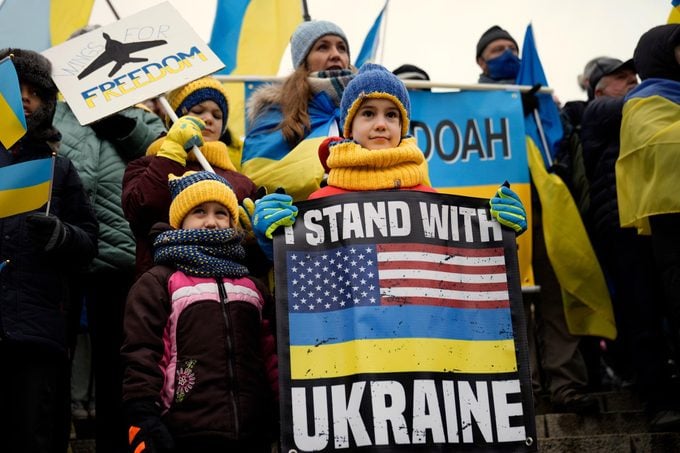One Year Later: How Will the Ukraine War End?
Updated: Mar. 06, 2023

One year into the Russia-Ukraine war, are we any closer to peace? Experts break down the possible outcomes of this fight—and what’s at stake for the world.
The Reader’s Digest Version
|
It’s been a little over a year since Russian missiles and bombs first fell on Ukrainian cities in the early-morning hours of Feb. 24, 2022. Since then, the casualties have been staggering: Nearly 300,000 soldiers on both sides have been wounded or killed, and the United Nations has verified that approximately 8,000 Ukrainian civilians are dead, though Ukraine puts that number closer to 100,000. Thousands of others have been injured, and many have been victims of war crimes. Additionally, roughly 8 million Ukrainian refugees have fled into Europe and beyond, and as many as 3 million may have been evacuated into Russia—either voluntarily or at gunpoint.
But these numbers tell just part of the story of the Russia-Ukraine war. This unprovoked war of aggression has been an embarrassing failure for Russia, which has been thwarted by an unforeseen, steadfast Ukrainian resistance that is outnumbered nearly 3 to 1. “Any Russian military successes were early and short-lived,” says Steven Horrell, non-resident senior fellow at the Center for European Policy Analysis and a professor at the U.S. Naval War College. “They captured a lot of square mileage, but they didn’t capture the key territories that they wanted.” Ukraine’s capital, Kyiv, and the northeastern hub city of Kharkiv were never taken, and Ukrainian forces have retaken a number of areas previously under Russian control, including the port city Kherson.
Russia’s failure to achieve military success has led to a virtual stalemate in recent months, but the war is still dragging on. Complicating things further, Putin recently pulled out of the only nuclear treaty left between the United States and Russia, and recent intelligence suggests China could enter the fray and trigger an escalation that leads to a larger global fight. In the midst of this, democratic leaders around the globe are trying to figure out how to help Ukraine.
So, how will the Ukraine war end—and when? Experts in the region say the situation is far too complicated, with too many variables, for simple answers. But they weighed in on the likelihood of the possible outcomes, from nuclear war to surrender by both sides, and explained why this fight continues to be so important.
Get Reader’s Digest‘s Read Up newsletter for more world news, tech tips, travel, cleaning, humor and interesting facts all week long.
Is the war winding down or ramping up?
Even though Ukraine has pushed Russian forces back into relatively small pockets in the east, that doesn’t mean we are at the end—or even at the beginning of the end—of the war, says Horrell. But as Winston Churchill famously said after American and British forces stopped Nazi advances in North Africa, “perhaps it is the end of the beginning.” There is currently a Russian offensive underway in southeast Ukraine, so Horrell doesn’t hold out too much hope for a quick resolution. Plus, he explains, “Russia’s offers of a ceasefire and peace talks leave their troops on the ground in Ukraine with the time and opportunity to regroup for further aggression.”
After ultimately retreating to its previous strongholds in the far east of Ukraine, Russia has had to go to great lengths to maintain its fighting strength. A mandatory conscription order in Russia allegedly caused an estimated 700,000 Russians to flee the country last fall. And the Wagner Group, a mercenary force helmed by an oligarch in Putin’s inner circle with a criminal past and a reported Hitler fixation, has reportedly been recruiting murderers and other violent offenders to fight in Ukraine in exchange for pardons and release back to Russia if they can survive six months of combat.
Ukraine isn’t backing down. In fact, Ukrainian president Volodymyr Zelensky has been openly pleading with his country’s American and European allies for the weaponry needed to keep Russia on its heels. During a recent visit to London, he asked for British fighter jets to help defend Ukrainian skies. In his speech, Zelensky also noted he had just spoken with King Charles III, before adding, “The king is an air force pilot. And in Ukraine today, every air force pilot is a king.”
How will the Ukraine war end?

“The war will end like all wars do—with a negotiation,” says Evelyn Farkas, executive director of the McCain Institute for International Leadership at Arizona State University and a former top advisor to the Secretary of Defense on Russia and Ukraine. “When and how that negotiation takes place depends on how much bloodshed and suffering happen in the meantime. One side has to be defeated, or both sides have to see they can’t win.”
For this Russia-Ukraine war update, Farkas and Horrell considered several scenarios that have been offered as possible outcomes. Here’s what’s on the table—along with the relative likelihood of each.
Possible outcome #1: Nuclear conflict
In late February 2023, Putin announced that he was withdrawing Russia from the New START nuclear weapons treaty, which limits the size and makeup of the United States and Russia’s nuclear arsenals. It was the last nuclear treaty in place between the two countries. While some fear this means we are inching closer to a world war, experts say it’s unlikely, and that Putin’s threats are little more than Kremlin fear-mongering. “This is all part of Putin’s playbook,” Horrell says. “For a year, he and his circle have been talking about ‘nuclear options,’ but the purpose is to sow doubt and fear to test the will of the West to stand with Ukraine.” Horrell cautions that pundits who dwell on this question are helping Putin by fomenting immediate fear of a threat so remote that it is essentially nonexistent.
“Russia won’t use nuclear weapons because if it does, the entire world will align against it,” says Farkas. “The rest of the world responding with conventional weapons could easily defeat Russia. There is really very low probability that Putin would authorize a nuclear attack.”
In short, a nuclear attack on any NATO country would be suicidal, and Putin knows that.
Possible outcome #2: European and U.S. forces join the war effort

As much as Putin has beat his chest and challenged the West, he knows that a conventional war with NATO forces to push Russian forces off Ukrainian territory would likely end quickly, and not in his favor. But while Europe and the United States have provided monetary support to Ukraine, as well as placed heavy sanctions on Russia, they have drawn the proverbial line in the sand at troops. Sending soldiers to Ukraine wouldn’t have popular support, and as it is, some politicians have voiced opposition to the continued monetary support.
That said, Western countries are still presenting a united front and standing with Ukraine. In President Biden’s recent speech in Kyiv, with Zelensky at his side, he said, “Putin thought Ukraine was weak and the West was divided. He thought he could outlast us. I don’t think he’s thinking that right now. One year later, the evidence is right here in this room: We stand here together.”
Possible outcome #3: China gets involved and backs Russia
Farkas is skeptical of suggestions that Russia could pull China, and its 2-million-strong active-duty military, into an alliance, despite a recent statement from U.S. Secretary of State Antony Blinken. “We can’t dismiss it out of hand, but we can’t be deterred by the threat to the point of capitulation” to Putin’s conquest of Ukraine, Farkas says. Western intelligence has long suspected China of providing Russia with technology and equipment that could have military applications, though not weapons themselves. China is Russia’s most prominent trade partner as a result of its refusal to participate in economic sanctions, and it profits mightily from its superior bargaining position, leaving little incentive to get involved in a shooting war where it has no real stake.
China has more to gain, Farkas says, by simply watching what happens in Ukraine and learning from the results. China has its eye on reclaiming the democratic island of Taiwan, so government officials are likely waiting to see whether the West will tire of financing and arming Ukraine in its fight for freedom. Farkas adds that this is a large motivator for the United States, the EU and Japan to keep supporting the Ukrainian war effort. “Our friends and allies understand that allowing Putin to succeed in taking land by force emboldens other bad actors around the world,” she explains.
More Stories About the War in Ukraine
|
Possible outcome #4: Russian victory
“We’re well past the point of Russia ‘winning’—meaning, wiping Ukraine off the map as a sovereign country and creating a vassal state in its place,” says Horrell. Russia’s inability to achieve a fast victory or even maintain its early gains suggests that Ukrainian resistance will not soon disappear. Horrell cautions, however, that Putin’s willingness to “throw bodies” into the fight and sacrifice lives for short-term gain should not be minimized.
Possible outcome #5: Ukrainian victory
Kyiv has pledged to fight until all Russian troops have left all Ukrainian soil, including Crimea. That is a tall order. While few can question the depth of Ukraine’s resolve after a year of war, its ability to keep fighting effectively largely depends on European and American good will, weapons and money. These may not be bottomless resources, but the governments involved appear to recognize what’s at stake if Russian aggression is rewarded.
Possible outcome #6: Stalemate and attrition

Until one side or the other begins making meaningful advances, taking and occupying new territory, the war will continue to be a slogging fight where progress is measured in square kilometers and body counts. How long can Ukraine hold out as casualty numbers climb? Typically in this sort of situation, something has to give and someone will offer to negotiate. But nothing has been typical about the Russia-Ukraine war to this point.
Thankfully, when attempting to answer the question of how the war in Ukraine will end, it seems that the most frightening options are also the least likely. But while nuclear war and outright Russian victory are off the menu, is a stalemate with reluctant negotiation, ceding some measure of territory to the occupiers, a “good” result? The only good result, our experts say, is Ukrainian victory.
What is the biggest obstacle to peace negotiations?
“One thing I did not foresee a year ago,” Farkas says, “is that Russia would take its Chechnya/Syria playbook and bring it to Ukraine.” She is referring to the Russian military’s targeting of civilian infrastructure, including bombing refugee escape routes, during its intervention in the Syrian civil war in 2015–2016 and its ruthless suppression of Chechnya’s attempt to secede from the Russian Federation in the early 2000s. “We have seen a level of inhuman brutality [in Ukraine] … savagery is an appropriate word to describe it.”
Beyond the bombing of schools, hospitals, residential buildings and the energy grid people need to survive freezing winter weather—all of which are designated war crimes—the inhumane treatment of individual Ukrainians by Russian occupiers isn’t a result of “bad apples gone amok.” These acts reflect a policy decision, Horrell says. “The systemic rape of women and girls, the killing of civilians in cold blood, evidence of prisoners tortured and killed—these aren’t outliers,” he explains.
On Feb. 18, 2023, Secretary of State Blinken declared these “crimes against humanity” and called for accountability for Russian leadership. But many say this doesn’t go far enough and want to legally designate the Russia-Ukraine war as an attempted genocide. The problem? While this could hold its leaders accountable, it will also make negotiating peace more difficult. Kyiv has insisted that Ukraine will not discuss peace until Russia faces a war crimes tribunal, something the Kremlin is highly unlikely to accept while its current leaders—presumably those who would be blamed for war crimes—remain in power.
What’s at stake for the world

Experts say defeating Putin is vital for international law and democracy. “We are more likely to see World War III if we don’t stop Putin in Ukraine,” says Farkas. “If Putin has anything like a victory in Ukraine, it means the end of the international order established over the past 75 years and a return to imperial conquest.” Horrell adds that we need to see a Ukrainian victory on Ukrainian terms because “when you leave actions like [Putin’s] unchecked, you invite more aggression.”
And that can put democracy at risk around the globe. “We are watching the front lines of democracy,” says Emily Channell-Justice, director of the Temerty Contemporary Ukraine Program at Harvard University. “We are all tired of this war, but the only way for it to stop is for Russia to stop dropping bombs and firing missiles. If Ukraine loses, Putin wins, and that means everything we believe about democracy doesn’t mean what we thought.”
Sources:
- Steven Horrell, non-resident senior fellow at the Center for European Policy Analysis and a professor at the U.S. Naval War College
- Army Technology: “Ukraine-Russia war: 300,000 casualties in a year of conflict”
- United Nations: “Türk deplores human cost of Russia’s war against Ukraine as verified civilian casualties for last year pass 21,000”
- Statista: “Estimated number of refugees from Ukraine recorded in Europe and Asia since February 2022 as of February 15, 2023, by selected country”
- Politico: “Zelenskyy pleads for jets in historic Westminster address”
- The Guardian: “‘He’s really dangerous’: fear as Wagner convict soldiers return from Ukraine”
- Evelyn Farkas, executive director of the McCain Institute for International Leadership at Arizona State University and a former top advisor to the Secretary of Defense on Russia and Ukraine
- The Guardian: “Putin says Russia will halt participation in New Start nuclear arms treaty”
- Associated Press: “Why China’s stand on Russia and Ukraine is raising concerns”
- U.S. Department of State: “Crimes Against Humanity in Ukraine”
- Emily Channell-Justice, director of the Temerty Contemporary Ukraine Program at Harvard University

















